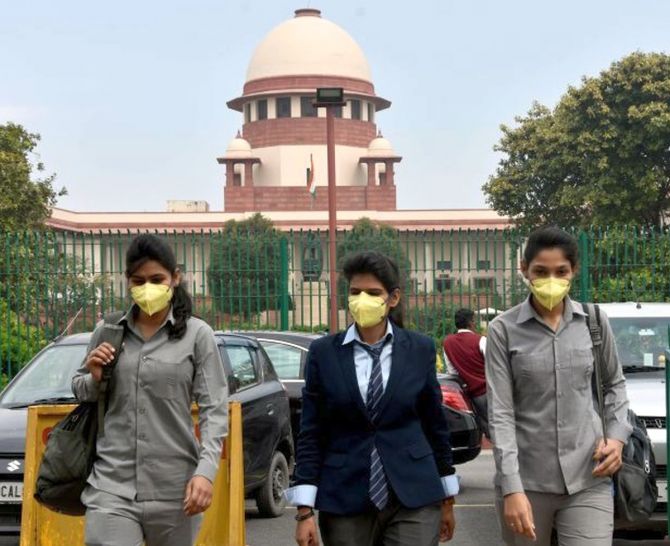The Supreme Court Thursday ordered reinstatement of a former Madhya Pradesh woman judicial officer, who resigned in 2014 following an inquiry into her allegations of sexual harassment against a high court judge, saying her resignation cannot be construed to be voluntary.

A bench of Justices L Nageswara Rao and B R Gavai set aside the order accepting her resignation and directed the Madhya Pradesh high court to reinstate her as additional district judge.
The apex court noted that a fortnight after her resignation, the petitioner had made a representation to the President as well as the Chief Justice of India, with a copy to the Chief Justice of the Madhya Pradesh high court, for reconsideration of the circumstances under which, she was left with no option but to resign.
Though it may not be possible to observe that the petitioner was forced to resign, however, the circumstances enumerated herein would clearly reveal they were such that out of frustration, she was left with no other alternative, it said.
"We hold and declare that the petitioner's resignation from the post of additional district and sessions judge, Gwalior, dated July 15, 2014, cannot be construed to be voluntary and order dated July 17, 2014 ... accepting resignation of the petitioner is quashed and set aside.
"The respondents are directed to reinstate the petitioner forthwith as an additional district & sessions judge. Though the petitioner would not be entitled to back wages, she would be entitled for continuity in service with all consequential benefits with effect from July 15, 2014," the bench said in its 86-page judgment.
The apex court said the petitioner has established that her transfer order was in contravention of the transfer policy and the rejection of her two representations was also arbitrary.
"Though it is the case of the respondent No.1 that the transfer order of the petitioner dated 8th July 2014, was on the ground of administrative exigencies, the material placed on record and particularly, the depositions of the then Judge on the transfer committee and the then RG, would clearly show that it was on the basis of the complaint made by the then district & sessions judge, Gwalior," the bench said.
The apex court said the transfer order of July 8, 2014, would squarely be covered by 'malice in law' as it was passed without taking into consideration the Guidelines provided in the transfer policy but on the basis of unverified allegations made in the complaint made by the then district & sessions judge.
On the submission of Solicitor General Tushar Mehta, appearing for the registrar general of the high court, that 'impulsive' decision of a judicial officer to resign cannot be said to be coercion, the top court said that no doubt, a judicial officer while discharging his/her duties, is expected to be independent, fearless, impassionate and non-impulsive.
"But a judicial officer is also a human being. A judicial officer is also a parent. He/she could be a father or a mother. The question would be, whether a judicial officer, while taking a decision in his/her personal matter as a human being, in his/her capacity of a father or mother, would be required to be guided by the same yardsticks," the bench said.
"For considering as to whether the resignation in the present matter could be construed as voluntary or not, the resignation cannot be considered in isolation, but all the attendant circumstances will have to be taken into consideration," the bench said, adding that one cannot imagine the trauma which the petitioner must have faced during short period of time.
The top court said the petitioner was also not aware that she was being transferred on the ground of the complaint made by the then district & sessions judge, Gwalior and had come to know about the complaint at a much later point of time.
The bench said that in her first representation, the petitioner elaborated in detail her precarious situation as she was required to be both a mother and father to her children and draw a balance between her professional duties and duties towards her daughters.
"She stated that on receipt of her transfer order, her elder daughter had become meek with fear and anxiety, as she faced an emotional trauma and a bleak prospect. The petitioner stated that at the cost of her career, she could not disturb the right of her daughter to decent education and curb her prospects for an inspirational life," said the top court.
"The petitioner only appealed that in order to avoid the emotional trauma and to support her daughter to complete her Class 12th, she should be continued at Gwalior for a short period. She also assured that after her daughter completes Class 12th, she would move on to whichever posting allocated to her. However, the same was rejected within two days ie, on 11th July 2014, without following the procedure prescribed under the transfer policy," the bench said.
The apex court added: "The judicial officer in her must have been battling with the mother in her. On one hand, was her career as a Judicial Officer; on the other hand, was the possibility of her daughter's educational prospects and career coming into jeopardy, if she shifted to the place of posting at Sidhi."
"A possibility of her mind engrossed with a feeling, that she was subjected to injustice by the very institution of judiciary, cannot be ruled away. What was she asking for? A retention at Gwalior for a period of 8 months till her daughter completes her Class 12th. In the alternative, posting at any of the 4 cities, which were admittedly in Category 'B', where her daughter could have better education facilities, and where the vacancies existed," the bench said.
It said that the denial of her legitimate expectation could have led to desperation, exasperation and frustration which is evident from the language used by her in her resignation letter.
"Reaction of a person to a particular situation would depend from person to person. No two individuals can be expected to respond identically to the same situation. It is quite possible that some other person in the petitioner's place, would have chosen to pursue one's own career without bothering about the daughter's education and prospects of a good career," the bench said.
The top court said the resignation letter in the present case appears to be on account of exasperation and frustration actuated by a thought that injustice was being meted out to her by the very Institution of Judiciary.
Senior advocate Indira Jaising, appearing for the woman, had submitted that the judicial officer was coerced and compelled to resign.
Mehta had told the top court that ground of "hostile work environment" which allegedly forced her to tender resignation is being raised four years after her allegations of sexual harassment.
The high court judge, against whom the sexual harassment complaint was made by her, was later given a clean chit in December 2017 by a Rajya Sabha-appointed panel that had probed the allegations.
The woman, in her plea, has said that the high court had ignored the categorical finding in the report of the judges inquiry committee dated December 15, 2017, terming the petitioner's resignation dated July 15, 2014, from her post of additional district judge "unbearable circumstances having no other option".
The plea added that the judges inquiry committee had opined that "the petitioner be reinstated to service since her resignation was tendered under coercion".
A motion of impeachment was admitted against the high court judge after 58 members of Rajya Sabha supported the woman's case.
The report of the panel comprising then Supreme Court judge R Bhanumathi, Justice Manjula Chellur (then Bombay high court judge), and jurist K K Venugopal (now attorney general for India) had given a clean chit to the high court judge and was tabled before the Rajya Sabha on December 15, 2017.











 © 2025
© 2025